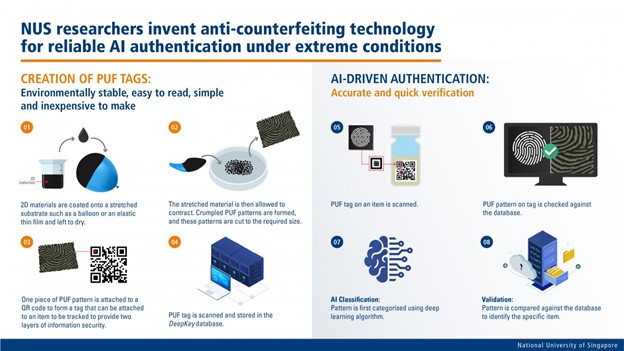Researchers at the National University of Singapore (NUS) innovated an anti-counterfeiting method dubbed DeepKey. The technology uses durable identification tags that are simple to produce and easy to authenticate with an AI algorithm. Target applications include securing medical products, e.g., COVID-19 vaccines, and high-value items that are stored under extreme conditions.
DeepKey works faster than existing anti-counterfeiting solutions and achieves highly accurate results. The tags are not easily damaged by environmental conditions such as extreme temperatures, chemical spills, UV exposure, and moisture.
The 2D-material secure tags exhibit Physically Unclonable Function patterns (PUF patterns), randomly generated by systematically crumpling the 2D-material thin films. The complex patterns with multi-scale features are then classified and validated by a well-trained deep learning model, enabling reliable (100% accurate) authentication in less than 3.5 minutes. Previous technology involved complicated manufacturing, ineffective readout processes, long authentication time, inferior environmental stability, and were expensive to make.
The team credits the adoption of deep learning that accelerated the overall authentication significantly, pushing the new technology closer to practical application. The solution involves breaking the long-lasting trade-off between high encoding capacity and long authentication time by using classifiable 2D-material PUF tags and deep learning algorithms. Researchers published their results in the scientific journal Matter. This study was conducted in collaboration with researchers from Anhui University of Technology and Nanyang Technological University.
The only available solution similar to DeepKey are polymer wrinkle-based tags that are also authenticated based on the surface patterns. However, authentication requires one-by-one feature extraction and matching, which is slow and yields only 80% reliability. Given the use of deep learning, DeepKey is much faster, reaching nearly 100% validation precision.
The NUS team has filed a patent for their invention and is now planning to push the technology while finding better, faster, and more robust readout and authentication approaches for the PUF tags. PUF tags could be further secured by being kept on blockchain so that the whole supply chain and quality control can be transparently tracked.

